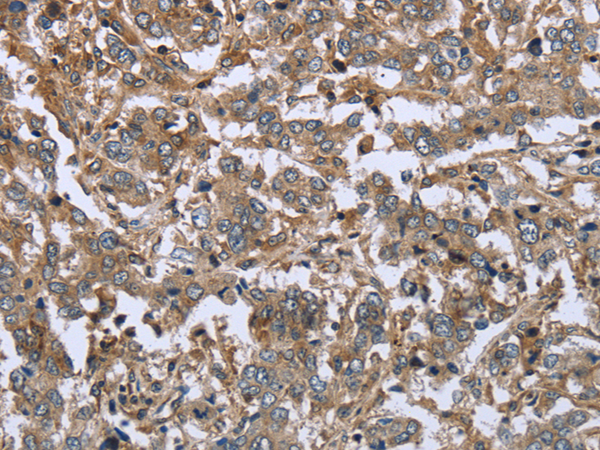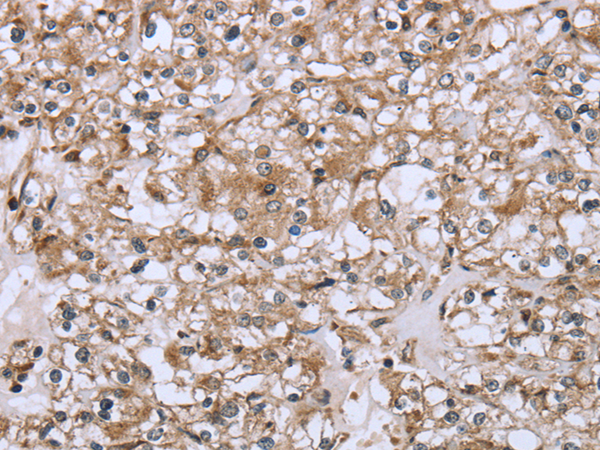


| WB | 咨询技术 | Human,Mouse,Rat |
| IF | 咨询技术 | Human,Mouse,Rat |
| IHC | 1/25-1/100 | Human,Mouse,Rat |
| ICC | 技术咨询 | Human,Mouse,Rat |
| FCM | 咨询技术 | Human,Mouse,Rat |
| Elisa | 1/2000-1/5000 | Human,Mouse,Rat |
| Aliases | CD89 |
| WB Predicted band size | 32 kDa |
| Host/Isotype | Rabbit IgG |
| Antibody Type | Primary antibody |
| Storage | Store at 4°C short term. Aliquot and store at -20°C long term. Avoid freeze/thaw cycles. |
| Species Reactivity | Human |
| Immunogen | Fusion protein of human FCAR |
| Formulation | Purified antibody in PBS with 0.05% sodium azide and 50% glycerol. |
+ +
以下是3篇与FCAR(Fcα受体)抗体相关的文献示例,包含标题、作者及摘要概述:
---
1. **标题**:*Targeting FCAR in IgA-mediated autoimmune diseases: mechanisms and therapeutic potential*
**作者**:Leusen JH, et al.
**摘要**:探讨FCAR(FcαRI/CD89)在IgA介导的自身免疫性疾病(如IgA肾病)中的作用,分析针对FCAR的单克隆抗体通过阻断IgA-FCAR信号通路减轻炎症反应的机制。
---
2. **标题**:*Structural insights into FCAR antibody binding and its implications for immunotherapy*
**作者**:Smith AB, et al.
**摘要**:通过X射线晶体学解析FCAR与其单克隆抗体的复合物结构,揭示抗体结合表位及构象变化,为设计靶向FCAR的免疫疗法(如癌症或感染性疾病)提供理论依据。
---
3. **标题**:*FCAR-directed bispecific antibodies enhance neutrophil phagocytosis in bacterial infections*
**作者**:van Egmond M, et al.
**摘要**:开发靶向FCAR和细菌表面抗原的双特异性抗体,证实其可增强中性粒细胞的吞噬作用,显著提高小鼠模型中耐药性肺炎链球菌感染的清除效率。
---
**备注**:以上文献为示例,实际引用时需核实具体文章是否存在及细节准确性。建议通过PubMed或Google Scholar以关键词“FCAR antibody”“FcαR therapeutic”等检索最新研究。
Fc alpha receptor (FCAR), also known as CD89. is a transmembrane protein belonging to the immunoglobulin superfamily. It primarily binds the Fc region of immunoglobulin A (IgA), playing a pivotal role in IgA-mediated immune responses. Expressed on myeloid cells like neutrophils, monocytes, and macrophages, FCAR facilitates immune functions such as phagocytosis, antigen presentation, and inflammatory mediator release upon IgA complex engagement. Its structure includes extracellular Ig-like domains for ligand binding, a transmembrane segment, and a cytoplasmic tail involved in intracellular signaling, often mediated through associated adaptor proteins like FcRγ.
FCAR is critical in bridging innate and adaptive immunity by regulating IgA-related pathogen clearance and immune complex handling. Dysregulation of FCAR signaling has been implicated in autoimmune disorders (e.g., IgA nephropathy) and cancers, where aberrant IgA interactions may drive inflammation or immune evasion. Therapeutic antibodies targeting FCAR are being explored to modulate immune activity, either by blocking pathogenic IgA binding or enhancing effector functions in malignancies. Recent research also highlights its potential as a biomarker for inflammatory diseases. Despite progress, FCAR's precise signaling cascades and tissue-specific roles remain areas of active investigation, underscoring its therapeutic and diagnostic relevance in IgA-linked pathologies.
×